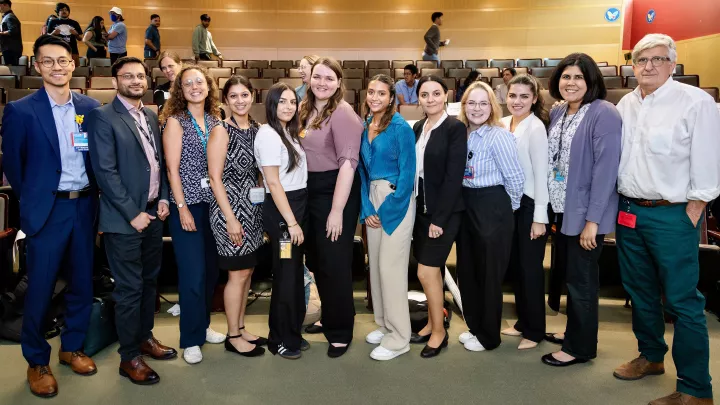
Shana Adise, PhD
Dr. Adise is an Investigator in the Division of Endocrinology, Diabetes and Metabolism at Children’s Hospital Los Angeles and Assistant Professor of Research Pediatrics at the Keck School of Medicine of USC. She received her bachelor’s in science in psychology, with a cognitive neuroscience emphasis, from the City College of New York, where she was also a recipient of the prestigious City College Fellowship. Dr. Adise received her PhD in nutritional sciences from Penn State University under the direction of Dr. Kathleen L. Keller. While at Penn State, Dr. Adise was a fellow in the USDA Childhood Obesity Prevention Training (COPT) program. Her dissertation studies were among the first to use functional magnetic resonance imaging (fMRI) to study how the brain responds to food and whether this was related to how much children ate. Dr. Adise completed her first postdoctoral fellowship at the University of Vermont under the direction of Hugh Garavan, which focused on skills necessary for utilizing big data (e.g., computational modeling) and novel structural MRI preprocessing techniques. She completed her second postdoctoral fellowship at CHLA, under the direction of Elizabeth Sowell, where she gained training in the field of neurocognitive development.
Over the past decade, Dr. Adise's research has focused on understanding the mechanisms that cause some children to overeat and develop obesity. Additionally, she is also interested in understanding the clinical implications of weight gain on neurocognitive development. Her work uses the combination of MRI, computational modeling and nutrition assessments to understand the relationship between weight gain, the brain and food intake during critical times in development, such as late childhood and early adolescence. Dr. Adise is also interested in understanding how social determinants of health may impact obesity risk and brain development amongst Latino populations. Dr. Adise’s research is currently funded by the National Institutes of Health (NIH).
Dr. Adise is also a Co-Investigator on the Adolescent Brain Cognitive Development (ABCD) Study at CHLA. The ABCD Study is a 21-site consortium study funded by the NIH. The focus is to understand how adolescent brain develops over time, with a particular focus on neurocognitive development. To learn more about the ABCD study, visit www.ABCDStudy.org.
Beyond her research accomplishments, Dr. Adise is an enthusiastic educator and mentor. Her dedication to teaching and mentorship was recognized by Penn State in 2016, when she was the recipient of the best graduate student teacher and mentoring award.
Education
PhD, Nutritional Sciences, Penn State University
Accomplishments
Society for the Study of Ingestive Behavior
FLUX Congress
Organization for Human Brain Mapping
2023–2027: NIH Mentored Research Scientist Award (K01)
2023–2025: Erika J. Glazer Career Development Award, CHLA
2023: Health Equity Action Network Early Stage Investigators Professional Development Award
2016–2017: Penn State's Kligman Graduate Fellowship
2016–2017: Penn State's SLEIC Dissertation Award
2016: Nutritional Sciences Graduate Student Teacher and Mentor Award
Publications
Adise S, Ottino-Gonzalez J, Goedde L, Marshall AT, Kan E, Rhee KE, Goran MI, Sowell ER. Variation in executive function relates to BMI increases in youth who were initially of a healthy weight in the ABCD Study. Obesity (Silver Spring). 2023 Sep 20;. doi: 10.1002/oby.23811. [Epub ahead of print]
Adise, S., Marshall, A.T., Kan, E., & Sowell, E.R. (2022) Access to quality health resources and environmental toxins affect the relationship between brain structure and BMI in a sample of pre and early adolescents. Frontiers in Public Health. DOI 10.3389/fpubh.2022.1061049
Adise, S., Marshall, A.T., Hahn, S., Zhao, S., Kan, E., Rhee, K., Herting, M.M. & Sowell, E.R. (2022). Longitudinal assessment of brain structure and behavior in youth with rapid weight gain: Potential contributing causes and consequences. Pediatric Obesity. 18(2), e12985. https://doi.org/10.15154/1503209
Adise, S., Marshall, A.T., Kan, E., Gonzalez, M., & Sowell, E.R. (2022). Area deprivation and childhood obesity: testing the causal theories of neuroinflammatory and neuronal stress models of obesity in pre- and early adolescents enrolled in the Adolescent Brain Cognitive Development Study. Health Psychology.
Adise, S., White, C. N., Roberts, N. J., Geier, C. F., & Keller, K.L. (2021). Children’s inhibitory control abilities in the presence of rewards are related to weight status and eating in the absence of hunger. Appetite. DOI: 10.1016/j.appet.2021.105610
Adise, S., Allgaier, N., Owens, M., Hahn, S., Nyugen, O., Yuan, D., Mackey, S., Chaarani, B., Laurent, J., Potter, A., & Garavan, H. P. (2021)). Multimodal brain predictors of current weight and future weight gain in children enrolled in the ABCD study. Developmental Cognitive Neuroscience. DOI: 10.1016/j.dcn.2021.100948
Adise, S., Geier, C. F., Roberts, N. J., White, C. N., Keller, K.L (2018). Food or money? Children’s brains respond differently to rewards regardless of weight status. Pediatric Obesity. DOI: 10.1111/ijpo.12469
Adise, S., Geier, C. F., Roberts, N. J., White, C. N., Keller, K.L (2018). Is the brain response to food rewards related to overeating? A test of the dynamic vulnerability model of overeating in children. Appetite. DOI: 10.1016/j.appet.2018.06.014
Laurent, J.S., Watts, R., Adise, S., Allgaier, N., Chaarani, B., Garavan, H.P., Potter, A., & Mackey, S. (2019). Associations between body mass index, cortical thickness, and executive function in children. JAMA Pediatrics. DOI: 10.1001/jamapediatrics.2019.4708
Research
Dr. Adise and her team are dedicated to understanding what causes obesity and how obesity may impact the developing brain. Obesity and overeating are associated with variation in neurocognition, which suggests that suboptimal functioning of brain regions that guide decision-making behavior (e.g., executive functions) may lead to poor food choices and weight gain. However, the mechanisms understanding these relationships are poorly understood.
To date, intervention programs that target improving executive function have shown some success for weight loss; however, results have been short-lived. Perhaps this is because we lack a refined understanding of the relationship between weight and suboptimal executive functioning, particularly during a time when the brain is still developing. Obesity is a deadly disease with long-term health outcomes, and recent research has suggested a link between weight gain and cognitive decline. As such, it is imperative to understand how weight gain affects neurocognition and whether intervention programs can be successful to mitigate both additional weight gain and continued effects to neurocognition.
Research Interests
Clinical consequences of weight gain during childhood and adolescence on brain development.


